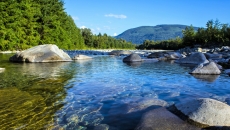The climate-change clock is ticking on the world's polar bears and a group of Canadian and U.S. scientists say they've determined when that time will run out.
The researchers used data on shrinking sea ice and detailed information on what the bears need to stay healthy and rear cubs to project the survival odds for 13 of the world's 19 bear populations through to the end of the century.
"It's very grim work," said Peter Molnar, a University of Toronto biologist who is the lead author on the study, published Monday in Nature Climate Change. "The sad part is that we have known for a very long time what is going to happen."
What hasn't been studied — until now — is when dramatic declines are likely to begin.
To determine those timelines, the researchers weighed what the bears need to live, reproduce and rear cubs against what their environment offers them.
"How long can a bear last on its energy stores?" Molnar asked. "What are some thresholds for a population beyond which reproduction and survival would decline?
"By using these new tools we can put numbers on when to expect these effects."
Polar bears depend on rich, fatty seals to get them through long periods of fasting, and they can only hunt that prey from sea ice — a platform rapidly shrinking due to climate change.
Foods on land, such as bird eggs, just don't have enough calories to keep the bears going over the long term.
"There's simply not enough energy on land in the places where bears live," Molnar said.
The researchers had enough information on projected ice conditions to forecast for eight of the 14 Canadian bear populations. They found cubs will be the first to go.
Even if the world were to manage to reduce greenhouse gas emissions, bears in northern Ontario on the south coast of Hudson Bay will be likely to have trouble raising new bears by the end of this decade.
Their cousins along the west coast of Hudson Bay would likely follow a year later and those in the southern Beaufort Sea a few years after that. By the early 2040s, bears in Davis Strait would join them.
Those four groups represent nearly a third of Canada's total bear population. Cub-rearing problems for almost all the rest of them are considered likely to occur within similar timelines.
And that's the optimistic take.
Under a business-as-usual scenario, reproductive failure would become inevitable for Hudson Bay and Davis Strait bears beginning in the 2060s. By the 2080s, it's likely that adult bears in those regions would be starving to death.
"We all have physiological limits," said Molnar.
A few populations — those in the northern Beaufort or Queen Elizabeth Islands — will probably be fine.
"With business-as-usual greenhouse gas emissions, polar bears are going to be gone from probably everywhere except the very High Arctic," Molnar said.
He acknowledged the conclusions are based on assumptions — though well-researched — and mathematical models. But the group used the same approach to look backward and compared the results to data from the field.
In every case, the model results agreed. Field studies in western Hudson Bay found bears healthy and fat through the 1980s, then with declining reproductive success and body condition into the late 1990s.
"That is exactly what our model 'predicts,' " said Molnar. "The model captures the dynamics of the past."
The information in the paper should be useful to polar bear managers in the years ahead. But Molnar hopes it will have a wider impact than that.
"My hope is that showing how grim and dire the situation really is will emphasize one more time how urgent the problem of dealing with climate change is.
"We know what needs to be done."






